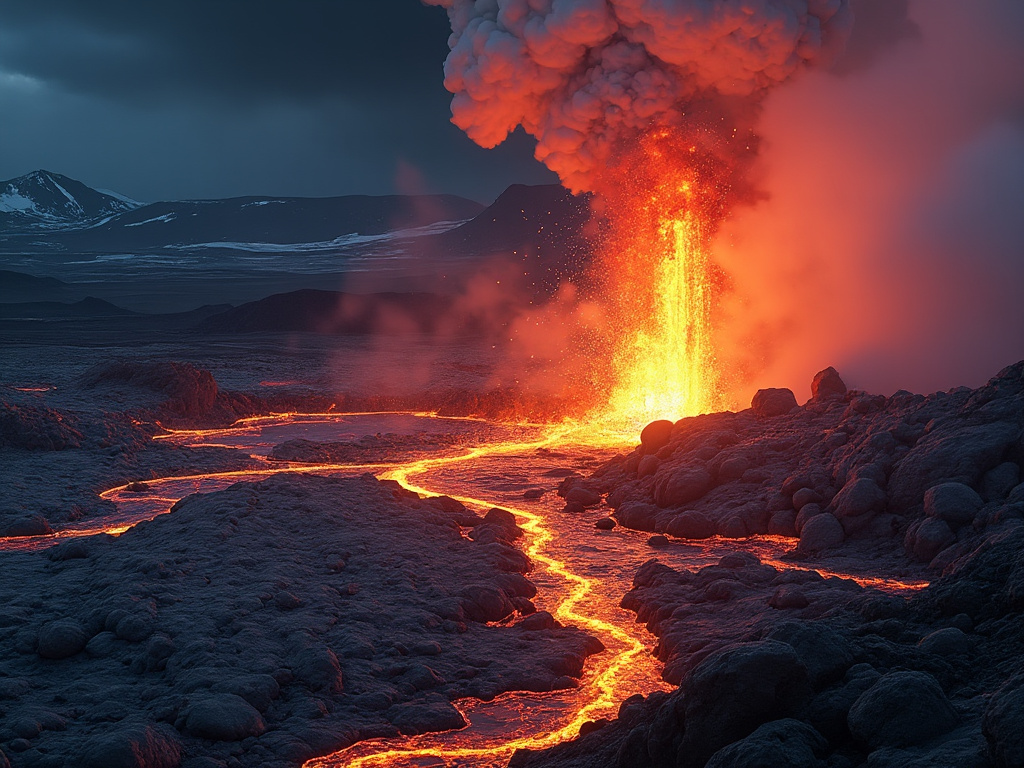
Volcanic Eruption in Iceland Triggers Evacuation of Grindavik Residents
Authorities evacuate residents and tourists as a fissure opens near Grindavik, spewing lava and creating an immediate threat to the town and surrounding areas.
A volcanic eruption occurred in south-west Iceland on April 1, 2025, forcing the evacuation of residents and tourists from the town of Grindavik and the renowned Blue Lagoon spa.
The eruption began around 6:30 a.m. local time, and has been characterized by a sizeable fissure opening, which has lengthened to approximately 1,200 meters (0.75 miles).
Heat and flames from the site have been visually striking as molten rocks erupt towards the ground.
The region, known for its significant volcanic activity, is located on the Reykjanes Peninsula, an area that has experienced renewed volcanic unrest since late 2020. Prior to this eruption, a series of earthquakes had been recorded, signaling potential volcanic activity.
In total, around 40 homes have been evacuated as safety measures were implemented.
Local authorities, including the Icelandic Meteorological Office (IMO), reported that the fissure has breached existing protective barriers designed to shield Grindavik, significantly increasing the danger to the community's approximately 4,000 residents.
The IMO noted that the activity associated with the eruption is unprecedented in recent history, with the magma column beneath the surface extending approximately 11 kilometers (6.8 miles), marking substantial geological activity since similar eruptions began in late 2023.
A hot water pipeline in Grindavik confirmed structural integrity issues within the town due to ground cracking.
While the volcanic activity showed signs of easing, authorities have urged citizens to adhere to evacuation orders for their safety.
Some residents have chosen to remain despite the risks, citing a strong attachment to their homes.
The direction of prevailing winds has been monitored closely, as volcanic gas emissions are expected to travel northeast towards the capital area, raising air quality concerns.
Although local experts deemed the eruption significant, they indicated that it should not impede air travel at this juncture.
Iceland, situated over the Mid-Atlantic Ridge, is home to 33 active volcanic systems, making it a focal point for geological research and monitoring.
This latest eruption marks continuing volcanic activity following centuries of dormancy in the region, with previous eruptions noted to have lasted for extended periods in the past.
Authorities continue to assess and adapt safety measures in response to real-time volcanic activity and seismic data.
The eruption began around 6:30 a.m. local time, and has been characterized by a sizeable fissure opening, which has lengthened to approximately 1,200 meters (0.75 miles).
Heat and flames from the site have been visually striking as molten rocks erupt towards the ground.
The region, known for its significant volcanic activity, is located on the Reykjanes Peninsula, an area that has experienced renewed volcanic unrest since late 2020. Prior to this eruption, a series of earthquakes had been recorded, signaling potential volcanic activity.
In total, around 40 homes have been evacuated as safety measures were implemented.
Local authorities, including the Icelandic Meteorological Office (IMO), reported that the fissure has breached existing protective barriers designed to shield Grindavik, significantly increasing the danger to the community's approximately 4,000 residents.
The IMO noted that the activity associated with the eruption is unprecedented in recent history, with the magma column beneath the surface extending approximately 11 kilometers (6.8 miles), marking substantial geological activity since similar eruptions began in late 2023.
A hot water pipeline in Grindavik confirmed structural integrity issues within the town due to ground cracking.
While the volcanic activity showed signs of easing, authorities have urged citizens to adhere to evacuation orders for their safety.
Some residents have chosen to remain despite the risks, citing a strong attachment to their homes.
The direction of prevailing winds has been monitored closely, as volcanic gas emissions are expected to travel northeast towards the capital area, raising air quality concerns.
Although local experts deemed the eruption significant, they indicated that it should not impede air travel at this juncture.
Iceland, situated over the Mid-Atlantic Ridge, is home to 33 active volcanic systems, making it a focal point for geological research and monitoring.
This latest eruption marks continuing volcanic activity following centuries of dormancy in the region, with previous eruptions noted to have lasted for extended periods in the past.
Authorities continue to assess and adapt safety measures in response to real-time volcanic activity and seismic data.



























